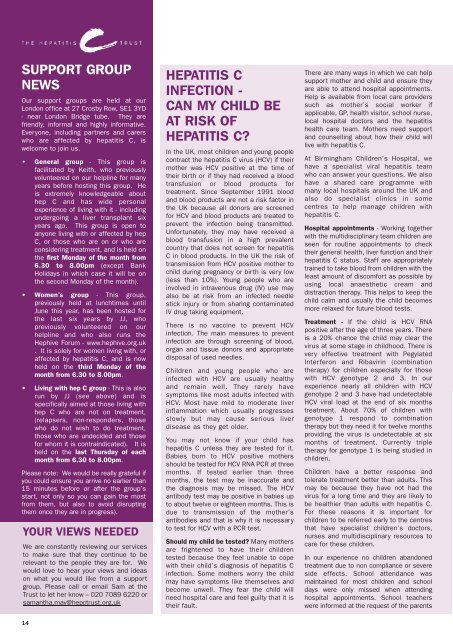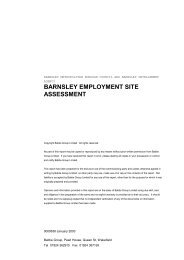IN THIS ISSUE… - Barnsley Council Online
IN THIS ISSUE… - Barnsley Council Online
IN THIS ISSUE… - Barnsley Council Online
Create successful ePaper yourself
Turn your PDF publications into a flip-book with our unique Google optimized e-Paper software.
SUPPORT GROUPNEWSOur support groups are held at ourLondon office at 27 Crosby Row, SE1 3YD- near London Bridge tube. They arefriendly, informal and highly informative.Everyone, including partners and carerswho are affected by hepatitis C, iswelcome to join us.• General group - This group isfacilitated by Keith, who previouslyvolunteered on our helpline for manyyears before hosting this group. Heis extremely knowledgeable abouthep C and has wide personalexperience of living with it - includingundergoing a liver transplant sixyears ago. This group is open toanyone living with or affected by hepC, or those who are on or who areconsidering treatment, and is held onthe first Monday of the month from6.30 to 8.00pm (except BankHolidays in which case it will be onthe second Monday of the month).• Women’s group - This group,previously held at lunchtimes untilJune this year, has been hosted forthe last six years by JJ, whopreviously volunteered on ourhelpline and who also runs theHephive Forum - www.hephive.org.uk. It is solely for women living with, oraffected by hepatitis C, and is nowheld on the third Monday of themonth from 6.30 to 8.00pm.• Living with hep C group - This is alsorun by JJ (see above) and isspecifically aimed at those living withhep C who are not on treatment,(relapsers, non-responders, thosewho do not wish to do treatment,those who are undecided and thosefor whom it is contraindicated). It isheld on the last Thursday of eachmonth from 6.30 to 8.00pm.Please note: We would be really grateful ifyou could ensure you arrive no earlier than15 minutes before or after the group’sstart, not only so you can gain the mostfrom them, but also to avoid disruptingthem once they are in progress).YOUR VIEWS NEEDEDWe are constantly reviewing our servicesto make sure that they continue to berelevant to the people they are for. Wewould love to hear your views and ideason what you would like from a supportgroup. Please call or email Sam at theTrust to let her know – 020 7089 6220 orsamantha.may@hepctrust.org.ukHEPATITIS C<strong>IN</strong>FECTION -CAN MY CHILD BEAT RISK OFHEPATITIS C?In the UK, most children and young peoplecontract the hepatitis C virus (HCV) if theirmother was HCV positive at the time oftheir birth or if they had received a bloodtransfusion or blood products fortreatment. Since September 1991 bloodand blood products are not a risk factor inthe UK because all donors are screenedfor HCV and blood products are treated toprevent the infection being transmitted.Unfortunately, they may have received ablood transfusion in a high prevalentcountry that does not screen for hepatitisC in blood products. In the UK the risk oftransmission from HCV positive mother tochild during pregnancy or birth is very low(less than 10%). Young people who areinvolved in intravenous drug (IV) use mayalso be at risk from an infected needlestick injury or from sharing contaminatedIV drug taking equipment.There is no vaccine to prevent HCVinfection. The main measures to preventinfection are through screening of blood,organ and tissue donors and appropriatedisposal of used needles.Children and young people who areinfected with HCV are usually healthyand remain well. They rarely havesymptoms like most adults infected withHCV. Most have mild to moderate liverinflammation which usually progressesslowly but may cause serious liverdisease as they get older.You may not know if your child hashepatitis C unless they are tested for it.Babies born to HCV positive mothersshould be tested for HCV RNA PCR at threemonths. If tested earlier than threemonths, the test may be inaccurate andthe diagnosis may be missed. The HCVantibody test may be positive in babies upto about twelve or eighteen months. This isdue to transmission of the mother’santibodies and that is why it is necessaryto test for HCV with a PCR test.Should my child be tested? Many mothersare frightened to have their childrentested because they feel unable to copewith their child’s diagnosis of hepatitis Cinfection. Some mothers worry the childmay have symptoms like themselves andbecome unwell. They fear the child willneed hospital care and feel guilty that it istheir fault.There are many ways in which we can helpsupport mother and child and ensure theyare able to attend hospital appointments.Help is available from local care providerssuch as mother’s social worker ifapplicable, GP, health visitor, school nurse,local hospital doctors and the hepatitishealth care team. Mothers need supportand counselling about how their child willlive with hepatitis C.At Birmingham Children’s Hospital, wehave a specialist viral hepatitis teamwho can answer your questions. We alsohave a shared care programme withmany local hospitals around the UK andalso do specialist clinics in somecentres to help manage children withhepatitis C.Hospital appointments - Working togetherwith the multidisciplinary team children areseen for routine appointments to checktheir general health, liver function and theirhepatitis C status. Staff are appropriatelytrained to take blood from children with theleast amount of discomfort as possible byusing local anaesthetic cream anddistraction therapy. This helps to keep thechild calm and usually the child becomesmore relaxed for future blood tests.Treatment - If the child is HCV RNApositive after the age of three years. Thereis a 20% chance the child may clear thevirus at some stage in childhood. There isvery effective treatment with PegylatedInterferon and Ribavirin (combinationtherapy) for children especially for thosewith HCV genotype 2 and 3. In ourexperience nearly all children with HCVgenotype 2 and 3 have had undetectableHCV viral load at the end of six monthstreatment. About 70% of children withgenotype 1 respond to combinationtherapy but they need it for twelve monthsproviding the virus is undetectable at sixmonths of treatment. Currently tripletherapy for genotype 1 is being studied inchildren.Children have a better response andtolerate treatment better than adults. Thismay be because they have not had thevirus for a long time and they are likely tobe healthier than adults with hepatitis C.For these reasons it is important forchildren to be referred early to the centresthat have specialist children’s doctors,nurses and multidisciplinary resources tocare for these children.In our experience no children abandonedtreatment due to non compliance or severeside effects. School attendance wasmaintained for most children and schooldays were only missed when attendinghospital appointments. School teacherswere informed at the request of the parents14
















